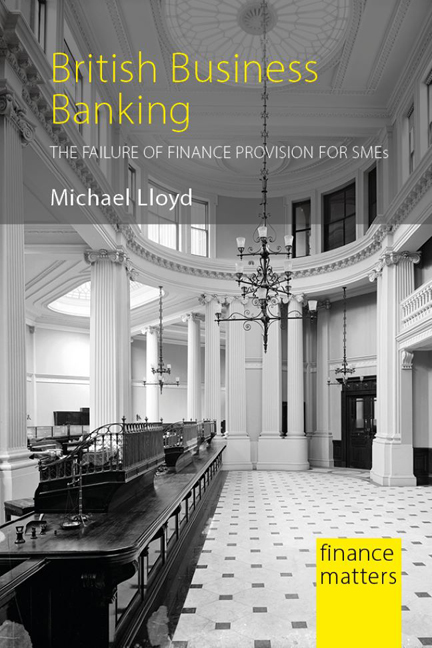Book contents
- Frontmatter
- Contents
- Acknowledgements
- Introduction
- 1 British banks and the industrial revolution
- 2 Modern British banking since 1900
- 3 From the other side: the culture of British SMEs
- 4 Banking problems for SMEs and alternative financial provision
- 5 UK financial and political economic culture
- 6 Optimum financial institutional structures and SME performance
- 7 Implementing reform
- Notes
- References
- Index
6 - Optimum financial institutional structures and SME performance
Published online by Cambridge University Press: 20 December 2023
- Frontmatter
- Contents
- Acknowledgements
- Introduction
- 1 British banks and the industrial revolution
- 2 Modern British banking since 1900
- 3 From the other side: the culture of British SMEs
- 4 Banking problems for SMEs and alternative financial provision
- 5 UK financial and political economic culture
- 6 Optimum financial institutional structures and SME performance
- 7 Implementing reform
- Notes
- References
- Index
Summary
It is evident that institutional and behavioural change is required if the problems outlined in previous chapters are to be addressed. This chapter will first suggest what may be considered the optimum conditions in an economy which need to be met in order to achieve effective financial institutional structures and strong business performance, especially for the key business sector of SMEs. The differing approaches of Germany, the United States, and the UK will then be compared in relation to these criteria. The aim will be to identify the institutional structures and modes of cultural behaviour in the three countries. The intention is not to suggest that there is some perfect set of institutional structures and operational behaviours which the UK should adopt. However, the contrasting situations will provide some clues as to what might, with advantage, be changed in the UK. The potential for changes will then be addressed: covering changes in banking institutional structures and operational practices; potential alterations in the policy approaches of the UK government in dealing with the British business banking sector, and improvements in SMEs’ performance, aimed at more productive interaction with banks. First, a summary list of optimum performance requirements, for banks, for SMEs, and for the state, are set out.
Optimal performance requirements
Banks
Bank lending to business involves risks. This is simply a reflection of the fact that business itself involves risk. Entrepreneurs are the supreme risk-takers. But most businesses need to consolidate their positions and try to reduce risks by achieving a level of competitivity to provide a stable platform to continue in business for many years. Their needs for finance and investment throughout their lifecycle, especially SMEs, will vary. Much of the finance of successful businesses may be sourced through retained earnings, but not all. Investment finance and working capital will be required from external sources, especially banks.
Historically, the role of banks has been to raise funds from savers via deposits, creating liquid funds, and recirculating these deposits to businesses needing to borrow to invest in productive capital. The businesses will also require working capital and this short-term funding they will also request from banks.
- Type
- Chapter
- Information
- British Business BankingThe Failure of Finance Provision for SMEs, pp. 119 - 140Publisher: Agenda PublishingPrint publication year: 2021



